
Tun Abdullah bin Ahmad Badawi is a Malaysian politician who served as the 5th Prime Minister of Malaysia from October 2003 to April 2009. He was also the sixth president of the United Malays National Organisation (UMNO), the largest political party in Malaysia, and led the governing Barisan Nasional (BN) parliamentary coalition. He is informally known as Pak Lah, Pak meaning 'Uncle', while Lah is taken from his name 'Abdullah'.

The Parliament of Malaysia is the national legislature of Malaysia, based on the Westminster system. The bicameral parliament consists of the Dewan Rakyat and the Dewan Negara. The Yang di-Pertuan Agong (King), as the head of state, is the third component of Parliament.
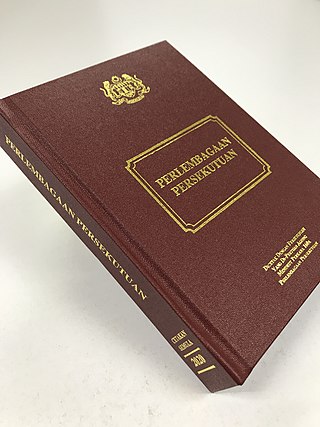
The Federal Constitution of Malaysia which came into force in 1957 as the Constitution of the Federation of Malaya and was amended in 1963 to form the constitutionof Malaysia, is the supreme law of Malaysia and contains a total of 183 articles. It is a written legal document influenced by two previous documents, the Federation of Malaya Agreement 1948 and the Independence Constitution of 1957. The Federation was initially called the Federation of Malaya and it adopted its present name, Malaysia, when the states of Sabah, Sarawak and Singapore became part of the Federation. The Constitution establishes the Federation as a constitutional monarchy, having the Yang di-Pertuan Agong as the Head of State with largely ceremonial roles. It provides for the establishment and organisation of three main branches of the government: the bicameral legislative branch called the Parliament, which consists of the House of Representatives and the Senate ; the executive branch led by the Prime Minister and his Cabinet Ministers and the judicial branch headed by the Federal Court.

Elections in Malaysia include elections to public office of the political entities that since 1963 have composed the federation of Malaysia. At present, elections in Malaysia exist at two levels: federal level and state level. Federal level elections are those for membership in the Dewan Rakyat, the lower house of Parliament, while state level elections are for membership in the various State Legislative Assemblies. The heads of executive branch at both the federal and state levels, the Prime Minister and Menteri Besar/Chief Ministers respectively, are indirectly elected, usually filled by a member of the majority party/coalition in the respective legislatures.
The Internal Security Act 1960 was a preventive detention law in force in Malaysia. The legislation was enacted after the Federation of Malaya gained independence from Britain in 1957. The ISA allows for detention without trial or criminal charges under limited, legally defined circumstances. On 15 September 2011, the Prime Minister of Malaysia, Najib Razak said that this legislation will be repealed and replaced by two new laws. The ISA was replaced and repealed by the Security Offences Act 2012 which has been passed by Parliament and given the royal assent on 18 June 2012. The Act came into force on 31 July 2012.
Preventive detention is an imprisonment that is putatively justified for non-punitive purposes, most often to prevent (further) criminal acts.

The protection of basic human rights is enshrined in Constitution of Malaysia. These include liberty of the person and prohibition of slavery and forced labour. At the national level, legislative measures that exist to prevent human rights violations and abuses can be found in acts and laws on issues that either have a human rights component or relate to certain groups of society whose rights may be at risk of being violated. Human rights groups are generally critical of the Malaysian government and the Royal Malaysia Police. Preventive detention laws such as the Internal Security Act and the Emergency Ordinance 1969 allow for detention without trial or charge and as such are a source of concern for human rights organizations like Suara Rakyat Malaysia.

The Internal Security Act 1960 (ISA) of Singapore is a statute that grants the executive power to enforce preventive detention, prevent subversion, suppress organized violence against persons and property, and do other things incidental to the internal security of Singapore. The present Act was originally enacted by the Parliament of Malaysia as the Internal Security Act 1960, and extended to Singapore on 16 September 1963 when Singapore was a state of the Federation of Malaysia.

The People's Alliance was an informal Malaysian political coalition and successor to Barisan Alternatif (BA). The political coalition was formed by the People's Justice Party (PKR), Democratic Action Party (DAP), and Pan-Malaysian Islamic Party (PAS) on 1 April 2008, after the 12th Malaysian general election, having previously formed the Barisan Alternatif in the 10th general election. On 20 April 2010, the Sarawak National Party (SNAP) officially joined as a member of the Pakatan Rakyat after being expelled from Barisan Nasional, but quit the coalition on 6 May 2011. The DAP declared the coalition "dead" on 16 June 2015, citing the inability of the rest of the alliance to work with PAS, after PAS's congress passed the motion to sever ties with DAP without debate. It was succeeded by Pakatan Harapan and Gagasan Sejahtera.
The 12th Malaysian Parliament is the last meeting of the legislative branch of the government of Malaysia, the Parliament, comprising the directly elected lower house, the Dewan Rakyat, and the appointed upper house, the Dewan Negara. It met for the first time at the Malaysian Houses of Parliament on 28 April 2008 and met for the last time on 29 November 2012. The King then dissolved the Parliament on 3 April 2013. The dissolution was announced by the Prime Minister Najib Razak after it consented by the King.
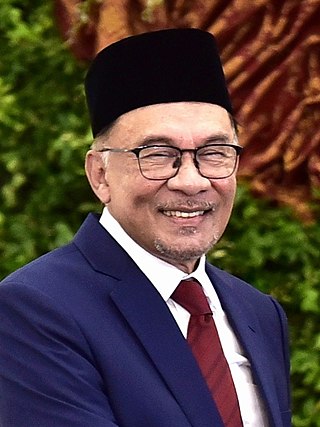
Anwar bin Ibrahim is a Malaysian politician who has served as the 10th Prime Minister of Malaysia since 24 November 2022. He served as the 12th and 16th Leader of the Opposition from August 2008 to March 2015 and again from May 2020 to November 2022. He has also served as Minister of Finance from March 1991 to September 1998 and again since December 2022 and 2nd Chairman of the Pakatan Harapan (PH) coalition since May 2020, 2nd President of the People's Justice Party (PKR) since November 2018 and the Member of Parliament (MP) for Tambun since November 2022. He also served as Deputy Prime Minister and in many other Cabinet positions in the Barisan Nasional (BN) administration under former Prime Minister Mahathir Mohamad from 1982 until his removal in 1998.

The 1993 amendments to the Constitution of Malaysia was passed by the Malaysian parliament with the aim of removing legal immunity of the royalty. The changes, which saw the amendments of Articles 32, 38, 42, 63, 72 and 181 in the Constitution of Malaysia, was implemented in March 1993. Before the amendments were made, the Constitution granted rulers who have violated the law not to be prosecuted by the criminal court unless he voluntarily wishes to surrender his legal immunity.

Dato' Seri Hamzah bin Zainudin is a Malaysian politician who has served as the 17th Leader of the Opposition since December 2022 and the Member of Parliament (MP) for Larut since March 2008. He served as the Minister of Home Affairs for the second term in the Barisan Nasional (BN) administration under former Prime Minister Ismail Sabri Yaakob from August 2021 to the collapse of the BN administration in November 2022 and the first term in the Perikatan Nasional (PN) administration under former Prime Minister Muhyiddin Yassin from March 2020 to the collapse of the PN administration in August 2021, Minister of Domestic Trade, Cooperatives and Consumerism, Deputy Minister of Foreign Affairs, Deputy Minister of Plantation Industries and Commodities and Deputy Minister of Housing and Local Government in the BN administration under former Prime Ministers Abdullah Ahmad Badawi and Najib Razak from March 2008 to the collapse of the BN administration in May 2018 as well as Senator from September 2000 to September 2006. He is a member of the Malaysian United Indigenous Party (BERSATU), a component party of the Perikatan Nasional (PN) coalition and was a member of the United Malays National Organisation (UMNO), a component party of the Barisan Nasional (BN) coalition. He has also served as Secretary-General of both BERSATU and PN since March 2020.
Counter-terrorism in Malaysia is a series of measures implemented in Malaysia to detect and prevent terrorism as well as to minimise damages from such terrorist acts should they occur. These measures involve all levels of security services including military, police, border and infrastructure security, civil defence, medical readiness and psychological preparedness. Malaysia also participates actively in international counter-terrorism efforts. Malaysia has experienced sustained terrorism threats from 1948 until 1989, particularly from the Malayan Communist Party. The Internal Security Act 1960 (repealed 2012, replaced with Security Offences Act 2012 was enacted to prevent terrorism in Malaysia.

The Malaysian United Indigenous Party, abbreviated BERSATU or PPBM, is a nationalist political party in Malaysia. The party was preceded by the United Indigenous Association of Malaysia. It is a major component party within the Perikatan Nasional coalition and the Barisan Nasional coalition, after the collapse of the Pakatan-led government. BERSATU was approved and fully registered on 14 January 2017 by the Registrar of Societies (ROS) and the use of the BERSATU logo was authorized by the Malaysian Election Commission (SPR). The party held the Prime Ministerial position as well as the majority of positions in the cabinet from May 2020 to August 2021. The party's founding members came from the United Malays National Organisation (UMNO) and Barisan Nasional rebel group Gabungan Ketua Cawangan Malaysia in 2016.
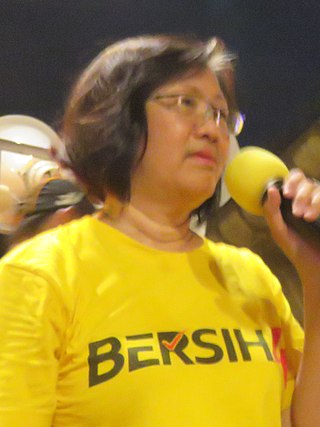
Maria Chin binti Abdullah also known as Mary Chin Cheen Lian is a Malaysian politician and social activist who served as the Member of Parliament (MP) for Petaling Jaya from May 2018 to November 2022. She is a member of the People's Justice Party (PKR), a component party of the Pakatan Harapan (PH) opposition coalition. She also held the Bersih rally and formed the Coalition for Clean and Fair Elections 2.0 and All Women's Action Society (AWAM) non-governmental organisations (NGOs). She served as the Chairperson of Bersih 2.0 from 2013 to 2018, the Chairperson of AWAM and the Executive Director of the Persatuan Kesedaran Komuniti Selangor (Empower). As a social activist, she champions both the women and human rights.
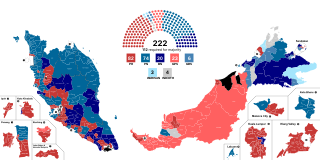
General elections were held in Malaysia on Saturday, 19 November 2022. The prospect of snap elections had been considered high due to the political crisis that had been ongoing since 2020; political instability caused by coalition or party switching among members of Parliament, combined with the fallout of the COVID-19 pandemic, contributed to the resignation of two prime ministers and the collapse of each of their respective coalition governments since the 2018 general elections.

The 2020–2022 Malaysian political crisis was a political crisis in Malaysia. It was caused by several members of the 14th parliament (MPs) changing party support, leading to the loss of a parliamentary majority, the collapse of two successive coalition governments, and the resignation of two Prime Ministers in less than 18 months. The crisis led to a 2022 snap general election and eventual formation of a national unity government.

The National Alliance is a political coalition composed of the Malaysian United Indigenous Party, Malaysian Islamic Party and Malaysian People's Movement Party. This coalition was preceded by the Malaysian Party Alliance Association, also known as the Persatuan Perikatan Parti Malaysia (PPPM).
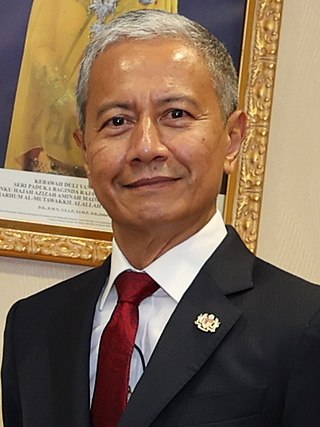
Azhar bin Azizan Harun, also known as Art Harun, is a Malaysian politician and lawyer who served as the 10th Speaker of the Dewan Rakyat from July 2020 to December 2022 and the 9th Chairman of the Election Commission (EC) from September 2018 to his resignation in June 2020.
















